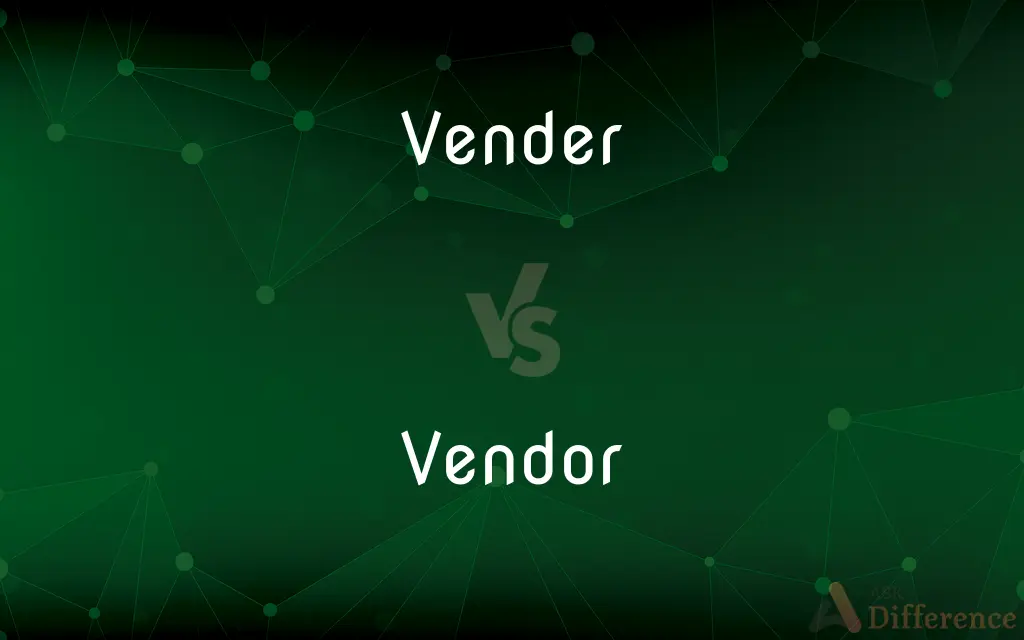Vender vs. Vendor — What's the Difference?
By Tayyaba Rehman — Updated on August 21, 2023
Vender is primarily the Spanish verb for "to sell." Vendor is an English noun for a person or company selling products or services.

Difference Between Vender and Vendor
Table of Contents
ADVERTISEMENT
Key Differences
Vender originates from the Latin word "vendere," meaning "to sell." In modern usage, "vender" is prominently seen in the Spanish language, where it acts as the verb that denotes the action of selling something. On the other hand, vendor, an English term, has its roots in the same Latin word but has evolved into a noun, describing an individual or entity that sells items or services.
Vender, in its application, focuses on the act itself. For instance, in a Spanish context, one might say "Quiero vender mi auto," meaning "I want to sell my car." In contrast, vendor is used in the English-speaking world to refer to someone or something that offers a product or service for sale. A food vendor, for instance, might sell meals at a fair or market.
When one encounters the word vender in a text, it is essential to recognize the linguistic context. If the text is in Spanish or pertains to Spanish contexts, the term relates to selling. Vendor, however, is specific to English usage and will seldom be seen in Spanish literature unless referring to the English concept.
Despite the linguistic boundaries that define vender and vendor, globalization and the integration of languages might cause overlaps. While vendor is a universally recognized term in business English, vender may occasionally be seen as a misspelling or typo. However, in proper Spanish contexts, vender holds its ground as a verb of significance.
When distinguishing between vender and vendor, one should remember their primary functionalities: one as a verb (vender) in the Spanish language and the other as a noun (vendor) in English, representing sellers or businesses.
ADVERTISEMENT
Comparison Chart
Language Origin
Spanish
English
Part of Speech
Verb
Noun
Meaning
To sell
Seller or provider
Usage in a Sentence
"Ella quiere venderlo."
"The vendor sells fruit."
Common Misconception
Often mistaken in English contexts
Sometimes misspelled as "vender"
Compare with Definitions
Vender
A Spanish verb meaning "to sell."
Voy a vender mi bicicleta.
Vendor
An individual or company that sells products or services.
The vendor set up his booth early in the morning.
Vender
To transfer possession for a price.
El artista decidió vender su pintura.
Vendor
As the software vendor, to bundle one's own, possibly modified version of dependencies with a standard program.
Strawberry Perl contains vendored copies of some CPAN modules, designed to allow them to run on Windows.
Vender
To offer or promote for sale.
Los agricultores van a vender sus productos en el mercado.
Vendor
In a supply chain, a vendor, or a seller, is an enterprise that contributes goods or services. Generally, a supply chain vendor manufactures inventory/stock items and sells them to the next link in the chain.
Vender
To exchange something for monetary value.
Quieren vender su casa para mudarse al extranjero.
Vendor
A supplier or distributor in a supply chain.
The company's primary vendor delivers every Monday.
Vender
Variant of vendor.
Vendor
A business or entity providing a specific product or service.
They sourced the software from a leading vendor.
Vender
To make available to be purchased.
Decidí vender mi viejo coche.
Vendor
A machine or device dispensing products upon receiving money.
The soda vendor at the station is out of order.
Vender
One who vends; one who transfers the exclusive right of possessing a thing, either his own, or that of another as his agent, for a price or pecuniary equivalent; a seller; a vendor.
Vendor
A vender; a seller; the correlative of vendee.
Vender
Someone who promotes or exchanges goods or services for money
Vendor
A person offering something for sale, often in a public space.
She's a popular street food vendor in the city.
Vender
Alternative spelling of vendor
Vendor
One that sells or vends something
A street vendor.
A vendor of software products on the Web.
Vendor
One that provides products or services to a business for a fee.
Vendor
A vending machine.
Vendor
Someone who promotes or exchanges goods or services for money
Vendor
A person or company offering something for sale, especially a trader in the street
An Italian ice-cream vendor
Vendor
A person or a company that vends or sells.
Vendor
A vending machine.
Vendor
To bundle third-party dependencies with the source code for one's own program.
I distributed my application with a vendored copy of Perl so that it wouldn't use the system copies of Perl where it is installed.
Common Curiosities
Is vender an English word?
No, vender is primarily a Spanish word meaning "to sell." In English contexts, it might be seen as a misspelling of "vendor."
Are vender and vendor interchangeable?
No, they are not. Vender is a Spanish verb, while vendor is an English noun.
Is it correct to use vender as a noun in English?
No, in English, "vender" is not a standard term. The correct noun for someone who sells something is "vendor."
Why do some people confuse vender with vendor?
The confusion might arise from their similar spelling and related meanings, but they serve different roles in their respective languages.
What does vendor mean in English?
Vendor refers to an individual, company, or entity that sells products or services.
What's a common error involving the word vendor?
A common error is misspelling "vendor" as "vender" in English contexts.
Can vendor refer to a machine?
Yes, in English, a vendor can also refer to a machine that sells products, like a vending machine.
If I see vender in an English document, is it always a mistake?
While it's often a typo in English contexts, always consider the overall content and intent of the document. It might be referencing the Spanish verb.
In which contexts would you use vender?
Vender is used in Spanish-speaking contexts to denote the act of selling something.
What's a synonym for vendor in English?
A synonym for vendor in English could be "seller" or "provider."
Share Your Discovery

Previous Comparison
Dinner vs. Diner
Next Comparison
Recluse vs. HermitAuthor Spotlight
Written by
Tayyaba RehmanTayyaba Rehman is a distinguished writer, currently serving as a primary contributor to askdifference.com. As a researcher in semantics and etymology, Tayyaba's passion for the complexity of languages and their distinctions has found a perfect home on the platform. Tayyaba delves into the intricacies of language, distinguishing between commonly confused words and phrases, thereby providing clarity for readers worldwide.














































